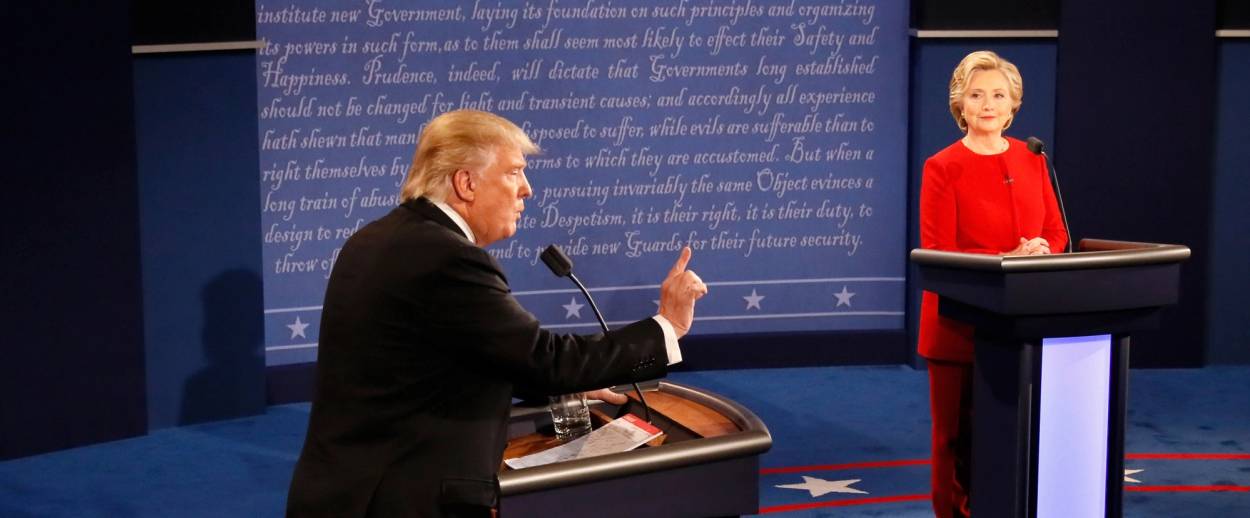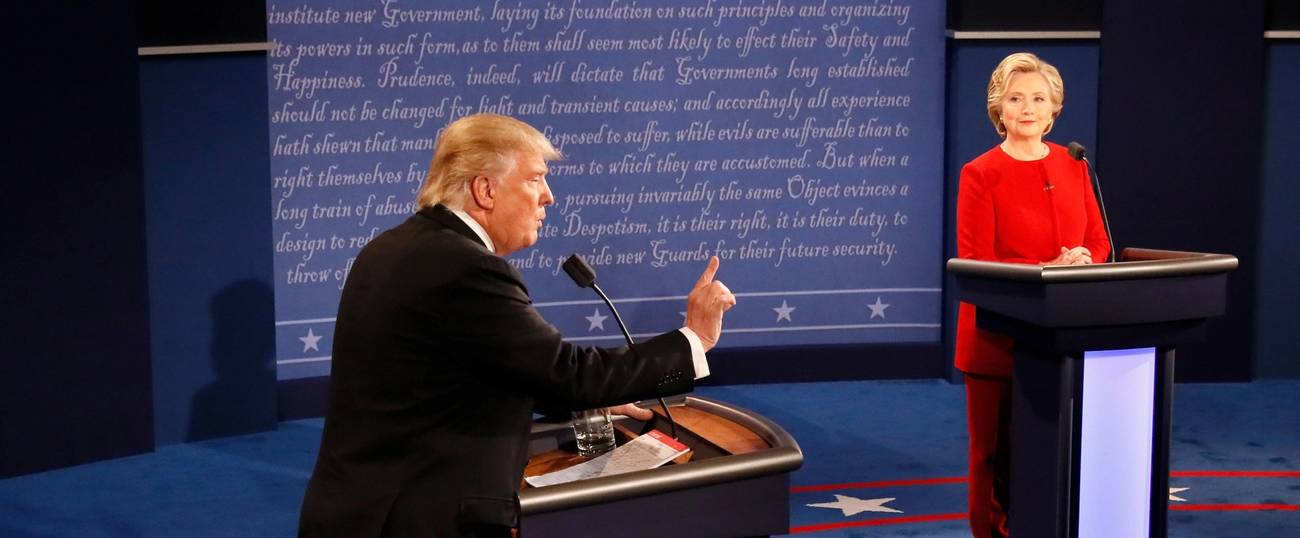The Great Male Hope
The presidential debate pitted an outdated, ‘tough-guy’ version of masculinity against the modern era, which is upon us anyway




Hillary Clinton defeated Donald Trump in the debate ten minutes ago (as I begin writing) because she showed that, at last, someone knows how to stand up to a macho bully. She talked; he interrupted. She persisted; he went on interrupting. In this fashion, she dominated. She affirmed; he complained. Eventually an aura emanated from her side of the stage. It signified self-confidence. She banged her biggest drum on the topic of NATO’s and America’s leadership in world affairs. “Our word is good,” she said about the United States and its treaties—which is to say, she spoke for America. Then again, she herself made the point about her domination when she responded to his accusations about her stamina. She cited certain things she has done—her world tours as Secretary of State, her ability to withstand eleven hours of questioning from the House committee on Benghazi. And she said that, when he has done anything similar, “he can talk to me about stamina.” That was the powerful line. The tough guy at Hofstra University was Hillary Clinton.
Toughness has been the issue all along in this campaign, and it has been Trump who insisted on making it so. Exactly why he has had a success in making this the issue is not entirely clear to me. Maybe it is because of a revulsion on some people’s part to President Barack Obama and his personal style—a revulsion not only because Obama is black but also because he is professorial and cerebral, unlike, say, his predecessor, George W. Bush. In any case, Trump with his rude behavior and outrageous remarks throughout the campaign has thrown down a challenge to one presumably tough character after another, to require everyone to respond. And no one has shown an ability to do so.
Trump said unforgiveable things to Jeb Bush about the Bush family and even about Jeb’s wife, and Jeb remained painfully courteous and placid. Trump’s insults of John McCain were preposterous; and McCain responded by endorsing Trump. Marco Rubio endorsed Trump. Paul Ryan endorsed Trump. The president of Mexico, Enrique Peña Nieto, having listened to Trump insult Mexico and the Mexican immigrants, responded by greeting him as if no insults at all had been said (to which Trump responded by returning to his insults later in the day). The only person to come under Trump’s insults who seemed to respond halfway admirably was Ted Cruz—and yet, in the end, Cruz, too, fell to his knees and endorsed Trump.
Why has this been so exciting to Trump’s supporters? Surely it has been because everyone has recognized that Professor Obama is on his way out, and the ultimate battle was always going to be the Battle of the Sexes—the battle between macho masculinity in the old-fashioned street-corner style, which is Trump’s, and the modern era that, having already allowed Obama to become president, is preparing the way, at last, for a woman. The purpose of Trump’s campaign until now has been to show that he is tougher than all of the men in the campaign, and therefore to show that he alone is capable of triumphing at the showdown.
But just now was the showdown, and she was tougher. She even looked like she knew it, too—Hillary smiling as if she were enjoying herself at one moment or another, Trump interrupting yet again to complain about how he was treated. She was tougher without being grotesque—tougher because she knew how to control herself, how to be humorous without going too far, how to be more disciplined than him in her responses. She was tougher because she knew how to speak for the United States.
I do not know why the male v. female issue should be so much alive in the United States, when the world long ago underwent the spectacle of Margaret Thatcher in the United Kingdom, and when Angela Merkel has for many years now been the most powerful person in Europe—even apart from the world’s experiences in observing Golda Meir in Israel and Michelle Bachelet in Chile and many other women leaders. But, for whatever reason, in America the male v. female issue has remained, in fact, alive. The election has been turning on this issue from the start, which is why Trump had his successes in out-machoing Jeb Bush and John McCain and everyone else. He was the Great Male Hope. And one hour ago—time has been passing—Hillary Clinton brought him down. At least, for the moment.
***
To read more of Paul Berman’s political and cultural analyses in Tablet magazine, click here.
Paul Berman is Tablet’s critic-at-large. He is the author of A Tale of Two Utopias, Terror and Liberalism, Power and the Idealists, and The Flight of the Intellectuals.